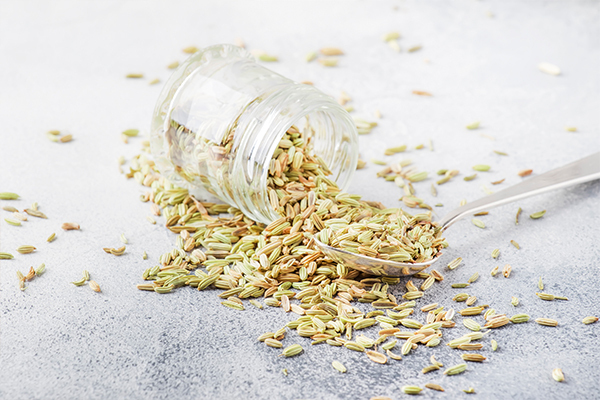In this article:
Indigestion or dyspepsia refers to the body’s inability to digest food, generally due to gastrointestinal problems. It is a fairly common issue that is generally resolved with diet modifications, home remedies and other self-care measures.

Home Remedies to Manage Indigestion
When suffering from indigestion, try to maintain a well-balanced diet.
The following easy remedies may also help take care of mild indigestion and provide symptomatic relief from dyspepsia.
1. Include probiotics in your diet

Probiotics contain beneficial bacteria that help maintain a healthy gut by replenishing the intestinal microflora.
Due to their various health benefits and positive influence on digestion, probiotics have been increasingly advised for indigestion. (1)(2) However, additional research is needed to determine its true efficacy and dosage. Consume pickles, yogurt, sauerkraut, or probiotic drinks.
2. Consume ginger
Ginger is a well-known remedy for stomach-related issues. It stimulates digestive juices and enhances the flow of enzymes, promoting good digestion.
Ginger is reported to aid in functional dyspepsia treatment by stimulating antral contractions and gastric emptying. However, its use for gastrointestinal issues is limited. (3)
3. Consume peppermint
Peppermint is widely known for its anti-inflammatory, stomachic, antiseptic, carminative, astringent, analgesic, decongestant, expectorant, and anesthetic properties. Peppermint can also help soothe digestion problems. (4)(5)
4. Use licorice root
Licorice root can have a positive impact on gastroenterological disorders by alleviating inflammation and muscle spasms in the gastrointestinal tract caused by indigestion. (6)(7)
5. Consider caraway
Caraway oil, along with peppermint oil or menthol, is used for the treatment of functional dyspepsia. (5) For relief from IBS symptoms, or colic and flatulence in children, caraway oil can be applied topically to the abdomen. (8)
6. Consume fennel

Fennel has been found to help in relieving digestion (9) and in reducing colic, gas, bloating, abdominal pain, indigestion, nausea, flatulence, and intestinal disorders.
Fennel contains a bioactive compound called fenchone that helps relax the smooth muscle lining of the digestive tract.
7. Use sodium bicarbonate
Sodium bicarbonate, or baking soda, helps neutralize stomach acid and thus manage acid reflux. You can mix 1 teaspoon of baking soda in a glass of water and consume the solution multiple times a day.
Caution: Avoid using this remedy for more than a week as its high salt content can cause swelling and nausea.
8. Chew gum
Chewing gum stimulates the production of saliva, which helps neutralize stomach acid when swallowed. (10)(11) Moreover, the swallowing action helps push the acid back into the stomach, thus preventing acid reflux.
Caution: Avoid excessive use of chewing gum as it can cause diarrhea.
9. Drink apple cider vinegar
Apple cider vinegar (ACV) is popularly used in the treatment of acid reflux, a common cause of indigestion. However, no research supports its use. Make sure to dilute ACV with warm water before consuming.
10. Consume mustard
Mustard contains various minerals and alkaline substances that can help neutralize stomach acid. You can consume 1 teaspoon of mustard or mix mustard seed powder in water and drink the mixture.
Caution: Avoid excessive consumption of mustard as it can cause diarrhea and inflammation. Use only cooked mustard seeds.
While these remedies may provide some relief from the uneasiness caused by indigestion, they need to be extensively studied before being used as clinical treatments. If your symptoms persist or become severe, consult a doctor.
Lifestyle Changes for Indigestion

The symptoms of indigestion usually can be managed and avoided by incorporating changes in your routine and lifestyle. The following are the things that you can and cannot do to fight this condition.
Dos
- Stay hydrated to ensure healthy digestion. Water also helps wash the acid that causes indigestion. But drink fluids after a meal, not during your meal.
- Avoid eating fast. Consume small meals and take your time when eating.
- Chew with your mouth closed to prevent swallowing air.
- Sit straight while eating.
- Relax after meals. You may also take a walk after your meal.
- To prevent the stomach acid from coming up while sleeping, keep your head and shoulder slightly elevated.
- Maintain a healthy weight.
- Maintain a food diary to identify food items that cause indigestion.
- Try to reduce stress through therapy or yoga.
- Consult with your healthcare provider for lactose intolerance or other common conditions that may cause indigestion.
Don’ts
- Avoid late-night eating, especially right before going to bed.
- Avoid spicy or fatty foods.
- Do not indulge in heavy physical activity after having a huge meal.
- Do not smoke.
- Avoid carbonated or fizzy drinks.
- Avoid alcoholic beverages.
- Avoid caffeine.
- Avoid foods that contain a lot of acids, such as tomatoes, tomato products, and oranges.
- Avoid tight-fitting garments as they may squeeze the stomach, causing stomach acid to enter the esophagus.
Most-Asked Questions About Indigestion

Does the keto diet cause indigestion?
If acid reflux causes indigestion, then a keto diet may further complicate the matter. Acid reflux symptoms increase in frequency after consuming foods that are high in fat as they take longer to digest.
How can one manage indigestion during menstruation?
To help manage indigestion during menstruation, try to control the fluctuation of hormones with the help of hormonal contraception.
You may also take careful note of your symptoms, diet, and physical activity to determine triggers. Even though period symptoms can result in feeling quite sick, it is completely normal to have digestion issues during periods.
Are indigestion and heartburn the same?
Indigestion is a general term referring to mild discomfort in the upper belly. One of the common symptoms of indigestion is heartburn.
Heartburn is characterized by a bitter taste in the mouth and throat along with a burning sensation in the lower portion of the chest. It occurs when the stomach acid goes to your food pipe.
What is the difference between indigestion and food poisoning?
Food poisoning is generally caused by a bacterial, viral, or rarely parasitic infection. The affected individual experiences abdominal pain, stomach cramps, severe diarrhea, and vomiting. It is more severe but shorter in duration than a stomach bug.
If the symptoms include stomach upset, heartburn, bloating, or gas without severe vomiting or diarrhea, the condition is indigestion, not an infection.
Is Iberogast good for treating indigestion?
Iberogast is a mixed herbal formulation that helps manage different digestive ailments, including heartburn and functional dyspepsia. (12)(13) While Iberogast can help treat indigestion, it is best to use it in chronic cases as there are simpler remedies available for mild cases.
Final Word
Indigestion is a common ailment that can present as a feeling of satiety or pain and burning in the upper abdomen. The treatment for indigestion depends on the causative factors. It is best to modify your diet and follow self-care measures to help prevent and treat indigestion.

- Was this article helpful?
- YES, THANKS!NOT REALLY


